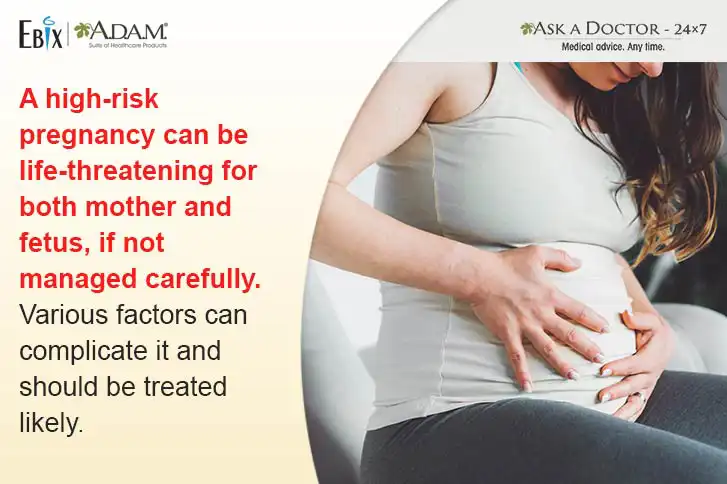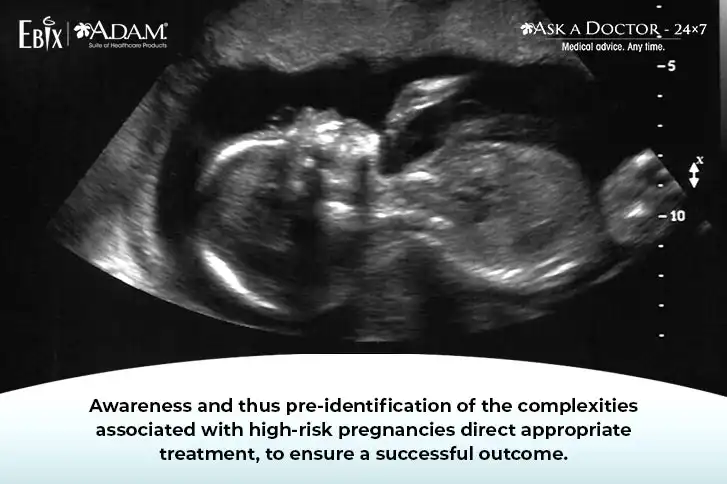High-Risk Pregnancy, Causes, Complications, And More
Getting pregnant is the beginning of an incredible journey of motherhood for women. However, for some, this journey could be tough as they discover their pregnancy to be high-risk.
Let’s understand the possible factors that may bring high pregnancy risks, and also know some of the tested ways to prevent those risks.
Factors That May Make a Pregnancy High-Risk

Maternal age – If expecting mothers are above 35 years, the risks of pregnancy increase. Teenage pregnancy is also linked with obstetric complications, though research is still going on to get shreds of evidence in support of this.
Pre-existing health conditions –The presence of any illness like PCOS, heart disease, diabetes, high or low blood pressure, respiratory or thyroid disorder, urinary infection, depression, or any autoimmune disease could be threatening to both the mother and the fetus, during the pregnancy, or even the post-natal phase.
Lifestyle- The success of pregnancy is considerably defined by the lifestyle of the woman. The use of drugs without prescription, alcohol, or tobacco just before or during pregnancy has adverse implications for the well-being of both, the mother and the fetus.
Pregnancy-related health conditions- Several risks like excessive vaginal bleeding, reduced fetal activity, abnormal abdominal pain, constant fever, unusual dizziness, or nausea may complicate a pregnancy further.
Multiple pregnancies- Pregnancy risks increase for women carrying more than one fetus inside the womb, a condition quite common in women conceiving through infertility treatments.
Complications Associated With A High-Risk Pregnancy
Let us know what complications could appear during a high-risk pregnancy.
Gestational diabetes- A tendency to develop diabetes during pregnancy, remains high in some women, and may lead to other related health problems.
Preeclampsia- Under this condition, pregnant women may develop hypertension and proteinuria i.e. protein in the urine.
Eclampsia- Preeclampsia may lead to eclampsia, a serious medical condition of having seizures during pregnancy.
Anemia- Iron deficiency before or during pregnancy can complicate it severely and may lead to health complications and developmental delays in newborns.
Premature labor/delivery –Pregnant women may get into preterm labor (before the completion of 37 weeks of gestation) or delivery.
Placenta previa –This is a low placental growth condition in which the placenta covers the cervix, leading to high bleeding risks during pregnancy
Cesarean delivery (C- section) - Pre-existing medical conditions, and complexities during preconception, pregnancy, or delivery could end up in C- section delivery.
Miscarriage or stillbirth- High-risk pregnancies have the risk of abrupt growth cessation or death of the fetus inside the womb, before or during delivery.
Birth defects in the fetus- The occurrence of severe blood infections, diabetes; heart, lung, or kidney disease, and delayed development or cerebral palsy in newborns are often associated with high-risk pregnancies.
Tips On How To Manage A High-Risk Pregnancy

Here are a few tips that can help manage high-risk pregnancy:
Discuss with your health provider- If you are suffering from any health issue, or have a family history of it, make sure you thoroughly discuss it with your doctor, as you plan to conceive. Your healthcare provider will decide which tests or medications you must take before you get pregnant to fix the serious implications later. You can also take help from online doctors to get an insight before planning your family or even post-conceiving.
Seek proper pre-natal care – If your healthcare provider informs you of the risk of having a high-risk pregnancy, follow regular prenatal visits to him.
Do not ignore multiple diagnostic and screening tests – To monitor any potential risks to you or your fetus, you could be advised to take regular ultrasounds, prenatal invasive genetic tests like amniocentesis or Chorionic villus sampling (CVS), or other as and when required. Make sure you take them timely, as suggested by your expert gynecologist.
Improve your lifestyle- If you are planning to conceive, you need to extemporize your lifestyle. You must avoid smoking, consuming alcohol, or any high-risk drug, and must switch to a healthy diet.
Every pregnancy is unpredictable but high-risk pregnancies are often allied with diverse complexities. It doesn’t imply that they will always be unsuccessful, yet it becomes crucial to listen to your body, monitor the body changes regularly, and be extra vigilant to combat the risks. With proper guidance and a plan, you can very well manage a high-risk pregnancy and cherish your journey of motherhood fearlessly.
To know more and to get answers to your further queries related to pregnancy and women's health, consult an Ob-Gynecologist.
Recently Answered Questions Related to High-risk Pregnancy
Ask a Specialist
Recent Questions


